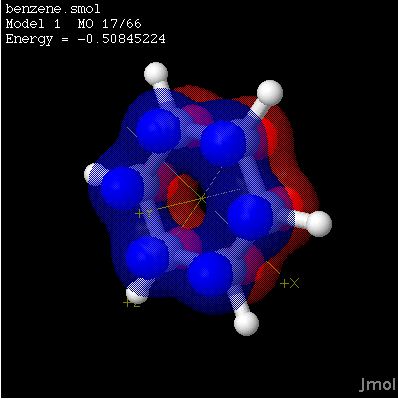Jmol is an open-source Java viewer for three-dimensional chemical structures with features for chemicals, crystals, materials and biomolecules.
Jmol returns a 3D representation of a molecule that may be used as a teaching tool, or for research e.g. in chemistry and biochemistry.
The software is for students, educators, and researchers in chemistry, biochemistry, physics, and materials science.
Features include:
- Applet, Application, and Systems Integration Component:
- The JmolApplet is a web browser applet that can be integrated into web pages. It is ideal for development of web-based courseware and web-accessible chemical databases. The JmolApplet provides an upgrade path for users of the Chime plug-in.
- The Jmol application is a standalone Java application that runs on the desktop.
- The JmolViewer can be integrated as a component into other Java applications.
- High-performance 3D rendering with no hardware requirements.
- Supports a wide range of molecular file formats:
- MOD – MDL / Elsevier / Symyx structure (classic version V2000).
- V3000 – MDL / Elsevier / Symyx structure (new version V3000).
- SDF – MDL / Elsevier / Symyx structure (multiple models).
- CTFile – MDL / Elsevier / Symyx chemical table (generic).
- CIF – Crystallographic Information File – standard from the International Union of Crystallography.
- mmCIF – Macromolecular Crystallographic Information File – standard from the International Union of Crystallography.
- CML – Chemical Markup Language.
- PDB – Protein Data Bank – Research Collaboratory for Structural Bioinformatics.
- XYZ – XYZ format, XMol file – Minnesota Supercomputer Institute.
- XYZ+vib – XYZ format with added vibrational vector information.
- XYZ-FAH – XYZ format for Folding@home.
- MOL2 – Sybyl, Tripos.
- Alchemy – Tripos.
- CSF – Fujitsu CAChe chemical structure, now Fujitsu Sygress.
- GAMESS – General Atomic and Molecular Electronic Structure System output (both US and UK variants) – Gordon Research Group, Iowa State University.
- Gaussian – Gaussian 94/98/03 output – Gaussian, Inc.
- Cube – Gaussian, Inc.
- Ghemical – The Ghemical computational chemistry package.
- MM1GP – Ghemical molecular mechanics file.
- HIN – IN / HIV files from HyperChem – Hypercube, Inc.
- Jaguar – Schrodinger, LLC.
- MOLPRO – Molpro output.
- MOPAC – MOPAC 93/97/2002 output (public domain).
- MGF – MOPAC 2007 (v.7.101) graphf output (public domain).
- NWCHEM – NWChem output – Pacific Northwest National Laboratory.
- odydata – Odyssey data – WaveFunction, Inc.
- xodydata – Odyssey XML data – WaveFunction, Inc.
- QOUT – Q-Chem, Inc.
- SHELX – Structural Chemistry Department, University of Göttingen (Germany).
- SMOL – Spartan data – Wavefunction, Inc.
- spinput – Spartan data – Wavefunction, Inc.
- GRO – Gromos87 format from GROMACS.
- PQR – Modified pdb format including charge and radius.
- Amber – The Amber package of molecular simulation programs.
- JME – Java Molecular Editor – Peter Ertl.
- CASTEP – The CASTEP software package, uses density functional theory.
- FHI-aims – Full-potential / all-electron electronic structure theory with local orbitals – Fritz-Haber-Institut der Max-Planck-Gesellschaft.
- VASP – VASP / VAMP / Vienna ab-initio simulation package.
- DGrid – Miroslav Kohout, Max-Planck Institute.
- ADF – ADF output – Amsterdam Density Functional.
- XSD – Accelrys Materials Studio.
- AGL – ArgusLab.
- DFT – Wien2k.
- AMPAC – AMPAC output – Semichem, Inc.
- WebMO – WebMO interface to computational chemistry packages.
- Molden – Electron density / molecular orbitals.
- PSI3 – Output files from the PSI3 suite of quantum chemical programs.
- CRYSTAL – Output files from CRYSTAL, a computational tool for solid state chemistry and physics. Theoretical Chemistry Group, Univ. Torino, Italy.
- Animations.
- Vibrations.
- Surfaces.
- Orbitals.
- Support for unit cell and symmetry operations.
- Schematic shapes for secondary structures in biomolecules.
- Measurements:
- Distance.
- Angle.
- Torsion angle.
- Support for the RasMol/Chime scripting language.
- JavaScript support library (Jmol.js).
- Exports to jpg, png, gif, ppm, pdf, POV-Ray, Gaussian, Maya, vrml, x3d, idtf, web page.
- Fully internationalised – Multi-language:
- Translated into multiple languages: Catalan (ca), Chinese (both zh_CN and zh_TW) Czech (cs), Dutch (nl), French (fr), German (de), Hungarian (hu), Italian (it), Korean (ko), Portuguese – Brazil (pt_BR), Spanish (es), Turkish (tr), (in addition to the native American English, en-US, and British English, en-GB).
-
- Automatically adopts the language of the user’s operating system, if it is among the translations available.
Website: jmol.sourceforge.net
Support: Handbook
Developer: Jmol Development Team
License: GNU Lesser General Public License

Jmol is written in Java. Learn Java with our recommended free books and free tutorials.
| Popular series | |
|---|---|
| The largest compilation of the best free and open source software in the universe. Each article is supplied with a legendary ratings chart helping you to make informed decisions. | |
| Hundreds of in-depth reviews offering our unbiased and expert opinion on software. We offer helpful and impartial information. | |
| The Big List of Active Linux Distros is a large compilation of actively developed Linux distributions. | |
| Replace proprietary software with open source alternatives: Google, Microsoft, Apple, Adobe, IBM, Autodesk, Oracle, Atlassian, Corel, Cisco, Intuit, SAS, Progress, Salesforce, and Citrix | |
| Awesome Free Linux Games Tools showcases a series of tools that making gaming on Linux a more pleasurable experience. This is a new series. | |
| Machine Learning explores practical applications of machine learning and deep learning from a Linux perspective. We've written reviews of more than 40 self-hosted apps. All are free and open source. | |
| New to Linux? Read our Linux for Starters series. We start right at the basics and teach you everything you need to know to get started with Linux. | |
| Alternatives to popular CLI tools showcases essential tools that are modern replacements for core Linux utilities. | |
| Essential Linux system tools focuses on small, indispensable utilities, useful for system administrators as well as regular users. | |
| Linux utilities to maximise your productivity. Small, indispensable tools, useful for anyone running a Linux machine. | |
| Surveys popular streaming services from a Linux perspective: Amazon Music Unlimited, Myuzi, Spotify, Deezer, Tidal. | |
| Saving Money with Linux looks at how you can reduce your energy bills running Linux. | |
| Home computers became commonplace in the 1980s. Emulate home computers including the Commodore 64, Amiga, Atari ST, ZX81, Amstrad CPC, and ZX Spectrum. | |
| Now and Then examines how promising open source software fared over the years. It can be a bumpy ride. | |
| Linux at Home looks at a range of home activities where Linux can play its part, making the most of our time at home, keeping active and engaged. | |
| Linux Candy reveals the lighter side of Linux. Have some fun and escape from the daily drudgery. | |
| Getting Started with Docker helps you master Docker, a set of platform as a service products that delivers software in packages called containers. | |
| Best Free Android Apps. We showcase free Android apps that are definitely worth downloading. There's a strict eligibility criteria for inclusion in this series. | |
| These best free books accelerate your learning of every programming language. Learn a new language today! | |
| These free tutorials offer the perfect tonic to our free programming books series. | |
| Linux Around The World showcases usergroups that are relevant to Linux enthusiasts. Great ways to meet up with fellow enthusiasts. | |
| Stars and Stripes is an occasional series looking at the impact of Linux in the USA. | |
